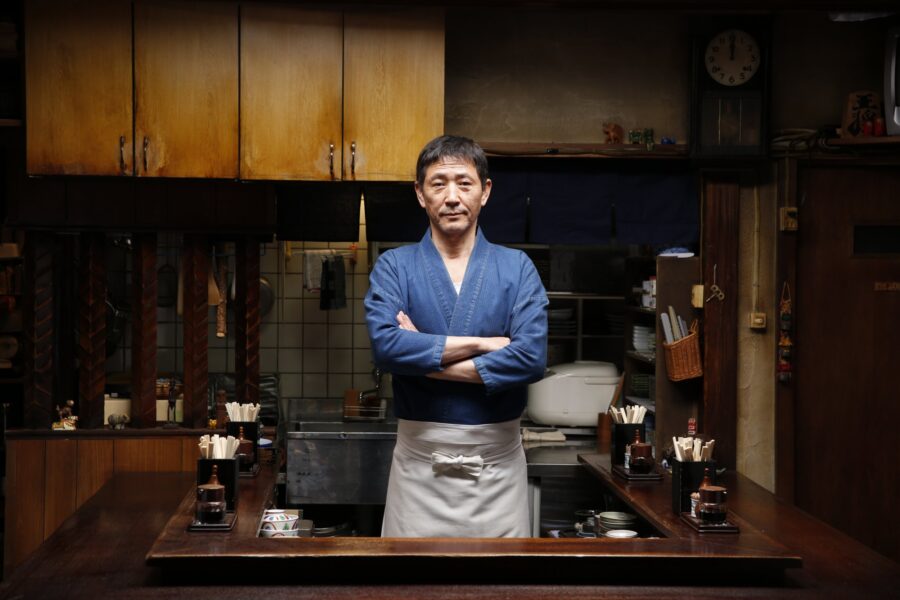At first, when a friend recommended Midnight Diner: Tokyo Stories, streaming on Netflix, I’d assumed it would be loud and cheerful, for some reason. I also expected it to be a food show along the lines of Ugly Delicious (which I quite enjoyed). Instead, when I finally got around to watching it, I was moved by the soft, stirring opening tune that played as the camera glided past Shinjuku’s neon-lit facade — the music in complete contrast with the flashy vibe of the busy Tokyo street.
Also in contrast with the ‘look-at-me’ lights and the modern signboards, is the diner the show is set in, with a hand-painted cloth sign and an old-worldly yellow lantern. A sort of refuge, a time capsule if you will, that welcomes those who cannot sleep or go home yet, to its small wooden table.
Master (as the mysterious man running the diner is known — played by Kaoru Kobayashi) says, “When people finish their day and hurry home, my day starts. My diner opens from midnight to seven in the morning. They call it Midnight Diner.” It’s a small, fictitious diner that can seat less than ten people and is modeled on the many eateries that dot the smaller lanes of Tokyo, serving hot food through the night, where steam from pots of broth invite you to drown the day’s sorrow in the comforting embrace of umami.
Master’s diner has a small menu — pork miso soup, sake, shochu, and beer. “I make whatever my customers request as long as I have the ingredients for it. That’s my policy. Do I even have customers you ask? More than you would expect,” he declares ahead of each episode. And then the name of the dish for the night is unveiled, as the charming old clock strikes 12.
This refrain from the Master that marks the beginning of each episode, comes again and again, a leitmotif in the series, sometimes in the middle, sometimes in the end. It, surprisingly, never gets annoying. Instead, it punctuates the show, bringing a sense of calm. Just the way, the ‘once upon a time’ refrain makes you smile, when you’re being told a bedtime story. The show creates its own grammar and remains committed to these elements, with admirable conviction. My favourite element is the breaking of the fourth wall towards the end, where the main characters of the episode explain how Master makes their dish of choice, and then they say Goodnight. I caught myself smiling when that happened the first time, and then every single time. The diner’s set has a lived-in feeling, adding years to the ambience, making it all the warmer.
Master’s ability to whip up a dish, often from people’s childhood, no longer sold in restaurants, brings him customers and makes regulars of them. He simply places the dish in front of them, the stories begin to pour out. Master does not judge anyone that walks through his doors. The latest season (2) of Midnight Diner, streaming now, features an orphan who becomes a CEO (chicken rice), a once-bright young man spending his days in pachinko slots, gambling away (curry ramen), a young woman who works as a stripper and her teacher with fading memory (plum rice ball), an ex-con woman who returns after serving her sentence (crab on the house), a beautiful kimono instructor — who’s a widow of a gangster — looking for a man (salmon and mushrooms), a burnt-out cartoonist (kitsune udon)… He welcomes them all the same way. They are all equals in that diner. Sitting at that table.
The show is gentle; it never judges its people. For who they are, what they do, who they choose to love or how they look. Instead, Master listens, occasionally tells them what they can do, but then quietly goes back to making food and minding his own business. The supporting cast is made up of people who star in other episodes, creating a warm universe that feels intimate.
There’s a certain sensuousness to the food, the making, the way it is laid out, that translates into the way the show is received as well. I found myself returning to it, every night, as I sat down for dinner. It is also one of those shows, you want to watch slowly for fear of running out of episodes.
All is not serious though at the diner. The writers show whimsy with something supernatural once in a while, like the ghost of a man’s mother who returns or small side tracks like the un-declared love of the ramen woman on the street-side, for a cop on midnight duty.
Recommended
Among my most favourite things about Midnight Diner is how it trains its lenses on the mundane, and culls out something genuinely stirring, remarkable or just plain beautiful, and its commitment to craft; one that shows us the ordinary too deserves the kind of attention we give to crafting epics. This is what, like the flavour Master builds while making his dishes — be it an earthy sauteed yam or hotpot for one — adds depth and colour to the show.
It is endearing. Largehearted, without being showy or loud about it. It is tolerant but doesn’t scream the ‘message’, instead it demonstrates this tolerance — which is the best way to do it on screen.
Most of all, it is stories of the humble and the hardworking, the flamboyant and the dazzling, the rich and the poor, and all those in between. It is an account of people, as they come to terms with life and its curveballs. Told with generosity, never reducing them to simplistic, convenient plot points. They just are. It just is.



